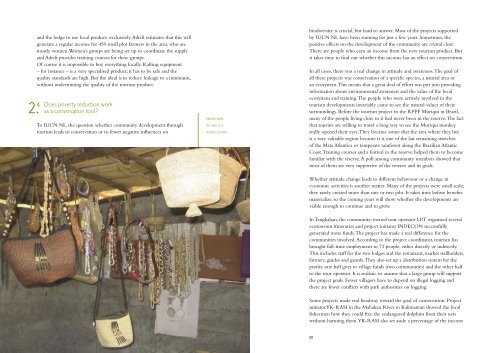OMSLAG 5.indd - IUCN
OMSLAG 5.indd - IUCN
OMSLAG 5.indd - IUCN
You also want an ePaper? Increase the reach of your titles
YUMPU automatically turns print PDFs into web optimized ePapers that Google loves.
2. 4<br />
and the lodge to use local produce exclusively. Adrift estimates that this will<br />
generate a regular income for 450 small plot farmers in the area, who are<br />
mostly women. Women’s groups are being set up to coordinate the supply<br />
and Adrift provides training courses for these groups.<br />
Of course it is impossible to buy everything locally. Rafting equipment<br />
– for instance – is a very specialised product; it has to be safe and the<br />
quality standards are high. But the ideal is to reduce leakage to a minimum,<br />
without undermining the quality of the tourism product.<br />
Does poverty reduction work<br />
as a conservation tool?<br />
To <strong>IUCN</strong> NL, the question whether community development through<br />
tourism leads to conservation or to fewer negative influences on<br />
Handicrafts<br />
for sale in a<br />
visitors centre<br />
38 39<br />
biodiversity is crucial, but hard to answer. Most of the projects supported<br />
by <strong>IUCN</strong> NL have been running for just a few years. Sometimes, the<br />
positive effects on the development of the community are crystal clear.<br />
There are people who earn an income from the new tourism product. But<br />
it takes time to find out whether this income has an effect on conservation.<br />
In all cases, there was a real change in attitude and awareness. The goal of<br />
all these projects was conservation of a specific species, a natural area or<br />
an ecosystem. This means that a great deal of effort was put into providing<br />
information about environmental awareness and the value of the local<br />
ecosystem and training. The people who were actively involved in the<br />
tourism developments invariably came to see the natural values of their<br />
surroundings. Before the tourism project in the RPPF Muriqui in Brazil,<br />
many of the people living close to it had never been in the reserve. The fact<br />
that tourists are willing to travel a long way to see the Muriqui monkey<br />
really opened their eyes. They became aware that the area where they live<br />
is a very valuable region because it is one of the last remaining stretches<br />
of the Mata Atlantica or temperate rainforest along the Brazilian Atlantic<br />
Coast. Training courses and a festival in the reserve helped them to become<br />
familiar with the reserve. A poll among community members showed that<br />
most of them are very supportive of the reserve and its goals.<br />
Whether attitude change leads to different behaviour or a change in<br />
economic activities is another matter. Many of the projects were small scale;<br />
they rarely created more than one or two jobs. It takes time before benefits<br />
materialize, so the coming years will show whether the developments are<br />
viable enough to continue and to grow.<br />
In Tangkahan, the community-owned tour operator LPT organised several<br />
ecotourism itineraries and project initiator INDECON successfully<br />
generated more funds. The project has made a real difference for the<br />
communities involved. According to the project coordinator, tourism has<br />
brought full-time employment to 73 people, either directly or indirectly.<br />
This includes staff for the two lodges and the restaurant, market stallholders,<br />
farmers, guides and guards. They also set up a distribution system for the<br />
profits: one half goes to village funds (two communities) and the other half<br />
to the tour operator. It is realistic to assume that a large group will support<br />
the project goals. Fewer villagers have to depend on illegal logging and<br />
there are fewer conflicts with park authorities on logging.<br />
Some projects made real headway toward the goal of conservation. Project<br />
initiator YK-RASI in the Mahakan River in Kalimantan showed the local<br />
fishermen how they could free the endangered dolphins from their nets<br />
without harming them. YK-RASI also set aside a percentage of the income
















